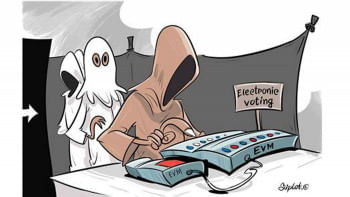Why is the EC so adamant to buy EVMs?

Pesky details continue to emerge about the Election Commission's controversial bid to buy 200,000 new Electronic Voting Machines (EVMs). In the latest revelation, The Daily Star, after analysing a copy of the project proposal, reported that the proposed price of EVMs was set without evaluating their current market price. The EC apparently formed a committee to assess the market price before preparing the proposal. But nothing came out of this exercise, as the committee only visited websites of different election commissions of countries where EVMs are used – which was no help – and then fixed the price based on a quote from the designated EVM supplier.
As part of the Tk 8,711.44 crore project, one EVM with all its accessories will cost Tk 3.33 lakh. That's more than 10 times what India paid to obtain one. It's also higher than what the EC itself spent – Tk 2.3 lakh – when it bought 150,000 EVMs in 2018. The EC tried to defend it by referring to the appreciation of dollar. This, alone, cannot explain the unusually high price structure or the EC's short yet questionable EVM purchase history. The EC also said that no information on the market price was publicly available for it to study. This is a laughable excuse. Has it reached out to any manufacturer for that information? The proposed price was clearly set arbitrarily, potentially to benefit those handling the finances of the project.

This is not the first time that this project has drawn critical scrutiny even before it could be approved by the Planning Commission. In October, it was revealed that the project proposal was sent without a feasibility study – which is essential for any development project worth Tk 50 crore or more – done beforehand. The excuse then given by the EC – with a vague reference to lack of time and its already gained experience in handling EVMs – was also laughable, as if the law of the land does not apply to it.
What all this shows is how arbitrarily and unnecessarily public money continues to be spent, often in ill-planned and questionable projects, despite the economic turmoil and consequent dollar crisis the country finds itself in. Just imagine: at least half a billion dollars will be needed to procure the new EVMs, even though at least 27,900 machines from the old stock have reportedly become unusable because of neglect. How justified is the project then? An even bigger question is: why is the EC so adamant to use a technically unreliable voting system that has been rejected by major opposition parties? The EVMs it plans to use in up to 150 parliamentary seats in the next general election have no Voter-Verified Paper Audit Trail (VVPAT), leaving them open to manipulation.
We, therefore, urge the authorities to take a critical look at both the proposed project for buying new EVMs and the rationale given for their use in the national election. The EC must ensure that the interests of citizens are reflected in its actions. It must not be driven by partisan or parochial interests if it wants to hold fair elections.


 For all latest news, follow The Daily Star's Google News channel.
For all latest news, follow The Daily Star's Google News channel. 






Comments